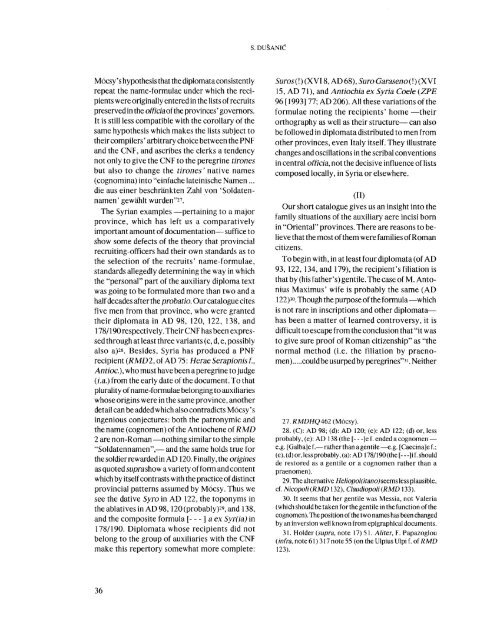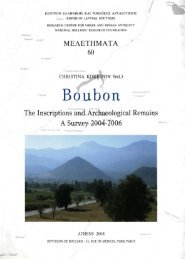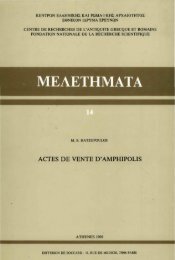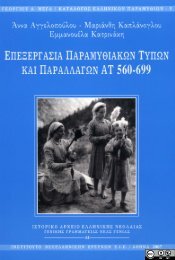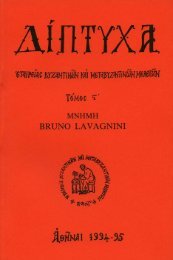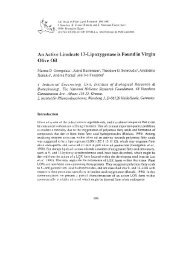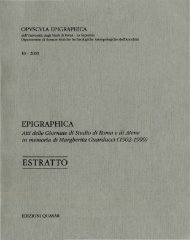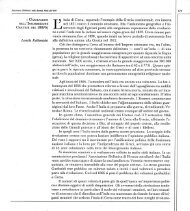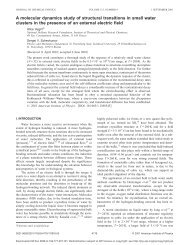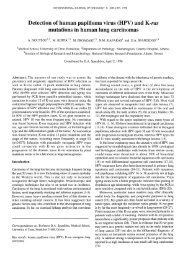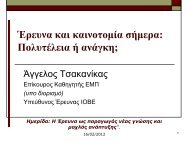Roman onomastics in the Greek East: social and political aspects ...
Roman onomastics in the Greek East: social and political aspects ...
Roman onomastics in the Greek East: social and political aspects ...
Create successful ePaper yourself
Turn your PDF publications into a flip-book with our unique Google optimized e-Paper software.
Mócsy's hypo<strong>the</strong>sis that <strong>the</strong> diplomata consistently<br />
repeat <strong>the</strong> name-formulae under which <strong>the</strong> recipients<br />
were orig<strong>in</strong>ally entered <strong>in</strong> <strong>the</strong> lists of recruits<br />
preserved<strong>in</strong> <strong>the</strong> officiaoï<strong>the</strong> prov<strong>in</strong>ces' governors.<br />
It is still less compatible with <strong>the</strong> corollary of <strong>the</strong><br />
same hypo<strong>the</strong>sis which makes <strong>the</strong> lists subject to<br />
<strong>the</strong>ir compilers' arbitrary choice between <strong>the</strong> PNF<br />
<strong>and</strong> <strong>the</strong> CNF, <strong>and</strong> ascribes <strong>the</strong> clerks a tendency<br />
not only to give <strong>the</strong> CNF to <strong>the</strong> peregr<strong>in</strong>e tirones<br />
but also to change <strong>the</strong> tirones' native names<br />
(cognom<strong>in</strong>a) <strong>in</strong>to "e<strong>in</strong>fache late<strong>in</strong>ische Namen...<br />
die aus e<strong>in</strong>er beschränkten Zahl von 'Soldatennamen'<br />
gewählt wurden" 27 .<br />
The Syrian examples —perta<strong>in</strong><strong>in</strong>g to a major<br />
prov<strong>in</strong>ce, which has left us a comparatively<br />
important amount of documentation— suffice to<br />
show some defects of <strong>the</strong> <strong>the</strong>ory that prov<strong>in</strong>cial<br />
recruit<strong>in</strong>g-officers had <strong>the</strong>ir own st<strong>and</strong>ards as to<br />
<strong>the</strong> selection of <strong>the</strong> recruits' name-formulae,<br />
st<strong>and</strong>ards allegedly determ<strong>in</strong><strong>in</strong>g <strong>the</strong> way <strong>in</strong> which<br />
<strong>the</strong> "personal" part of <strong>the</strong> auxiliary diploma text<br />
was go<strong>in</strong>g to be formulated more than two <strong>and</strong> a<br />
half decades after <strong>the</strong> probatio. Our catalogue cites<br />
five men from that prov<strong>in</strong>ce, who were granted<br />
<strong>the</strong>ir diplomata <strong>in</strong> AD 98, 120, 122, 138, <strong>and</strong><br />
178/190 respectively. Their CNF has been expressed<br />
through at least three variants (c, d, e, possibly<br />
also a) 28 . Besides, Syria has produced a PNF<br />
recipient (RMD2, of AD 75 : Herae Serapionis f.,<br />
Antioc), who must have been a peregr<strong>in</strong>e to judge<br />
(i.a.) from <strong>the</strong> early date of <strong>the</strong> document. To that<br />
plurality of name-formulae belong<strong>in</strong>g to auxiliaries<br />
whose orig<strong>in</strong>s were <strong>in</strong> <strong>the</strong> same prov<strong>in</strong>ce, ano<strong>the</strong>r<br />
detail can be added which also contradicts Mócsy's<br />
<strong>in</strong>genious conjectures: both <strong>the</strong> patronymic <strong>and</strong><br />
<strong>the</strong> name (cognomen) of <strong>the</strong> Antiochene of RMD<br />
2 are non-<strong>Roman</strong> —noth<strong>in</strong>g similar to <strong>the</strong> simple<br />
"Soldatennamen",— <strong>and</strong> <strong>the</strong> same holds true for<br />
<strong>the</strong> soldier rewarded <strong>in</strong> AD 120. F<strong>in</strong>ally, <strong>the</strong> orig<strong>in</strong>es<br />
as quoted supra show a variety of form <strong>and</strong> content<br />
which by itself contrasts with <strong>the</strong> practice of dist<strong>in</strong>ct<br />
prov<strong>in</strong>cial patterns assumed by Mócsy. Thus we<br />
see <strong>the</strong> dative Syro <strong>in</strong> AD 122, <strong>the</strong> toponyms <strong>in</strong><br />
<strong>the</strong> ablatives <strong>in</strong> AD 98,120 (probably) 29 , <strong>and</strong> 138,<br />
<strong>and</strong> <strong>the</strong> composite formula [— ] a ex Syr(ia) <strong>in</strong><br />
178/190. Diplomata whose recipients did not<br />
belong to <strong>the</strong> group of auxiliaries with <strong>the</strong> CNF<br />
make this repertory somewhat more complete:<br />
36<br />
S. DUSANIC<br />
Suros ( ! ) (XVI8, AD 68), Suro Garaseno ( ! ) (XVI<br />
15, AD 71), <strong>and</strong> Antiochia ex Syria Coele (ZPE<br />
96 [ 1993] 77; AD 206). All <strong>the</strong>se variations of <strong>the</strong><br />
formulae not<strong>in</strong>g <strong>the</strong> recipients' home —<strong>the</strong>ir<br />
orthography as well as <strong>the</strong>ir structure— can also<br />
be followed <strong>in</strong> diplomata distributed to men from<br />
o<strong>the</strong>r prov<strong>in</strong>ces, even Italy itself. They illustrate<br />
changes <strong>and</strong> oscillations <strong>in</strong> <strong>the</strong> scribal conventions<br />
<strong>in</strong> central officia, not <strong>the</strong> decisive <strong>in</strong>fluence of lists<br />
composed locally, <strong>in</strong> Syria or elsewhere.<br />
(ID<br />
Our short catalogue gives us an <strong>in</strong>sight <strong>in</strong>to <strong>the</strong><br />
family situations of <strong>the</strong> auxiliary aere <strong>in</strong>cisi born<br />
<strong>in</strong> "Oriental" prov<strong>in</strong>ces. There are reasons to believe<br />
that <strong>the</strong> most of <strong>the</strong>m were families of <strong>Roman</strong><br />
citizens.<br />
To beg<strong>in</strong> with, <strong>in</strong> at least four diplomata (of AD<br />
93, 122,134, <strong>and</strong> 179), <strong>the</strong> recipient's filiation is<br />
that by (his fa<strong>the</strong>r's) gentile. The case of M. Antonius<br />
Maximus' wife is probably <strong>the</strong> same (AD<br />
122) 30 . Though <strong>the</strong> purpose of <strong>the</strong> formula—which<br />
is not rare <strong>in</strong> <strong>in</strong>scriptions <strong>and</strong> o<strong>the</strong>r diplomata—<br />
has been a matter of learned controversy, it is<br />
difficult to escape from <strong>the</strong> conclusion that "it was<br />
to give sure proof of <strong>Roman</strong> citizenship" as "<strong>the</strong><br />
normal method (i.e. <strong>the</strong> filiation by praenomen)<br />
could be usurped by peregr<strong>in</strong>es" 3 '. Nei<strong>the</strong>r<br />
27. RMDHQ462 (Mócsy).<br />
28. (C): AD 98; (d): AD 120; (e): AD 122; (d) or, less<br />
probably, (e): AD 138 (<strong>the</strong> [—]e f. ended a cognomen —<br />
e.g. [Galba]ef.—ra<strong>the</strong>rthan agentile—e.g. [Caec<strong>in</strong>a]ef.;<br />
(e), (d) or, less probably, (a): AD 178/190 (<strong>the</strong> [- - -]i f. should<br />
de restored as a gentile or a cognomen ra<strong>the</strong>r than a<br />
praenomen).<br />
29. The alternative HeliopoI(itano)stems less plausible,<br />
cf. Nicopoli (RMD 132), Claudiopoli(RMD 133).<br />
30. It seems that her gentile was Messia, not Valeria<br />
(which should be taken for <strong>the</strong> gentile <strong>in</strong> <strong>the</strong> function of <strong>the</strong><br />
cognomen). The position of <strong>the</strong> two names has been changed<br />
by an <strong>in</strong>version well known from epigraphical documents.<br />
31. Holder (supra, note 17) 51. Aliter, F. Papazoglou<br />
(<strong>in</strong>fra, note 61 ) 317 note 55 (on <strong>the</strong> Ulpius Ulpi f. of RMD<br />
123).


